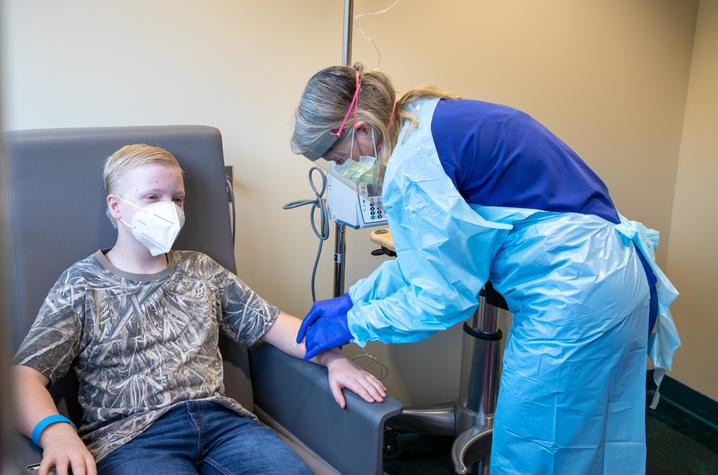Q&A: Monoclonal Antibody Therapy and COVID-19

The University of Kentucky Public Relations and Strategic Communications Office provides a weekly health column available for use and reprint by news media. This week's column is by Samantha Bochenek, Pharm.D., director of infusion pharmacy services for UK HealthCare.
LEXINGTON, Ky. (Oct. 18, 2021) — Monoclonal antibody therapy is an infusion treatment that can reduce the severity of COVID-19. Here are some of the commonly asked questions about the treatment.
Q: What are monoclonal antibodies and how do they work?
A: Monoclonal antibodies are proteins created in a lab. The proteins mimic your immune system and are meant to make COVID-19 disease milder in patients who are already sick.
Q: Who is eligible to receive the treatment?
A: The Food and Drug Administration (FDA) has issued an Emergency Use Authorization to permit the use of monoclonal antibody therapy for the treatment of mild to moderate COVID-19 in adult and pediatric patients (12 years of age and older weighting at least 85 pounds) who test positive for COVID-19 and who are at high risk for moderate to severe COVID-19.
Q: If I can get antibody treatment when I get COVID, why do I need to bother with the vaccine?
A: The vaccine has been shown to be highly effective at preventing the acquisition of COVID-19 and significantly reduces symptoms if any strain is contracted. The monoclonal antibody is not as effective as the vaccine at preventing COVID-19 and you can’t get the therapy until after you test positive. It is also crucial to get the monoclonal antibody treatment quickly after discovering a positive case. Depending on where you live, it may be difficult to schedule the treatment and should be considered a last line of defense to avoid hospitalization from this disease. Lastly, monoclonal antibody treatment may not work for everyone, which is another reason to get vaccinated.
Q; I tested positive for COVID, but I don’t have symptoms. Can I get the antibody treatment?
A: If you test positive and have one of the risk factors for severe COVID-19, including, but not limited to, being 65 or older, obesity, chronic kidney disease, diabetes, immunosuppressive disease, immunosuppressive treatment, cardiovascular disease, sickle cell disease, pregnancy, chronic lung disease, neurodevelopmental disorders or other conditions that confer medical complexity (for example: cerebral palsy, genetic/metabolic syndromes, severe congenital anomalies, or medical related technological dependent (for example: tracheostomy or gastrostomy)), you should contact your primary care provider and ask for a referral to receive the treatment.
Q: Is the treatment effective?
A: Monoclonal antibodies have been shown to be effective, but more data is required for full FDA approval. Currently, the medication is only available through an Emergency Use Authorization.
Q: How can I get the therapy?
A: You should speak with your primary care provider regarding monoclonal antibody therapy. Monoclonal antibody therapy requires a physician order.
Q: How is it administered?
A: The medication can be administered via an intravenous infusion or four shots in four different locations on the body. A health care provider must administer the therapy since it requires a one-hour observation period post administration to ensure the medication was well tolerated.
As the state’s flagship, land-grant institution, the University of Kentucky exists to advance the Commonwealth. We do that by preparing the next generation of leaders — placing students at the heart of everything we do — and transforming the lives of Kentuckians through education, research and creative work, service and health care. We pride ourselves on being a catalyst for breakthroughs and a force for healing, a place where ingenuity unfolds. It's all made possible by our people — visionaries, disruptors and pioneers — who make up 200 academic programs, a $476.5 million research and development enterprise and a world-class medical center, all on one campus.




